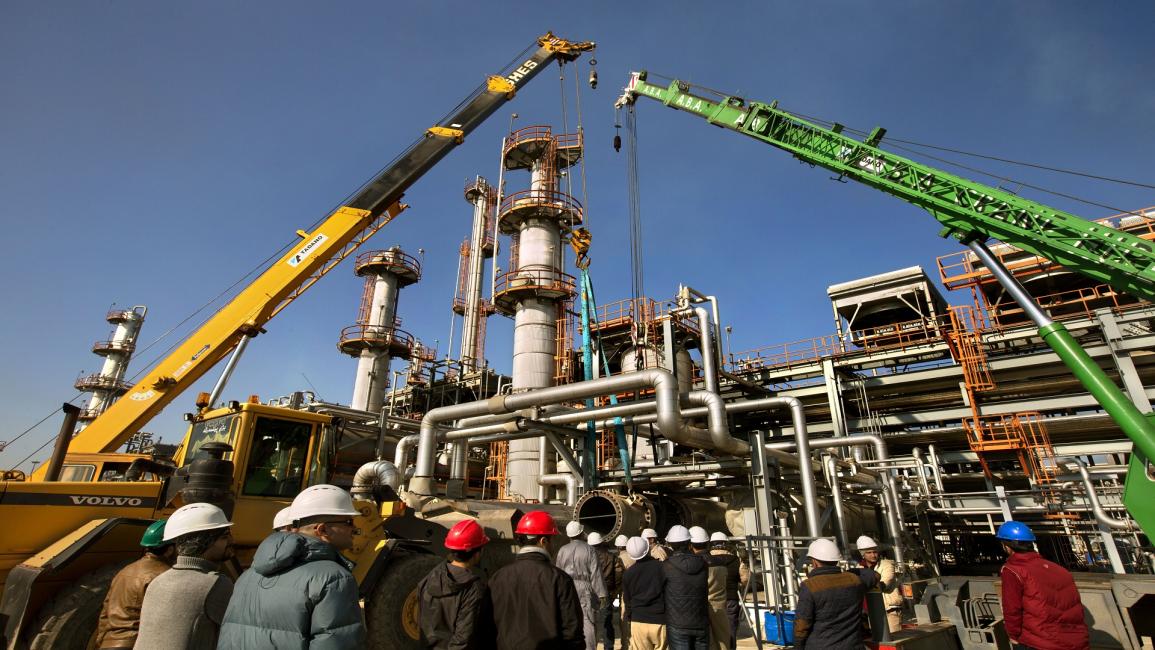Alwaght- After over two years of halt, Iraqi Kurdistan region has resumed its oil exports via the Turkish Port of Ceyhan. This development is an outcome of a new deal between Kurdistan Regional Government (KRG) and the federal government in Baghdad, an agreement described "historic" by the two sides that would close one of the oldest cases of dispute between Baghdad and Erbil.
Where did the crisis begin?
A long-running oil revenue dispute between Iraq and its Kurdistan region escalated in March 2023, when Turkey halted oil flows from northern Iraq. The shutdown followed an international arbitration court ruling that ordered Ankara to pay Iraq $1.5 billion in compensation for facilitating unauthorized Kurdish oil exports between 2014 and 2018.
Iraq had originally brought the case to the International Chamber of Commerce in Paris in 2014, arguing that Turkey had enabled the KRG to illegally export oil without the federal government's consent.
The Kirkuk-Ceyhan pipeline at the heart of the dispute began operations in 1977, following an initial agreement between Iraq and Turkey signed on August 27, 1973. The pipeline was designed to provide Iraq with a direct export route to global markets via the Mediterranean, bypassing the Strait of Hormuz.
Initially, the central government in Baghdad owned and controlled the entire pipeline. However, after the fall of Saddam Hussein's regime in 2003, Erbil began building its own energy infrastructure and started connecting oilfields to the Ceyhan pipeline via new links it constructed. This move allowed the semi-autonomous region to export oil largely independent of Baghdad.
This approach by the Kurds stirred a political and legal dispute with Baghdad, leading to a legal tension that finally was ruled by the Supreme Court of Iraq and the International Court of Justice (ICJ) as violating sovereignty of the Iraqi federal government.
After several rounds of inconclusive talks, Erbil and Baghdad finally reached a breakthrough agreement earlier this year. The KRG agreed to hand over management of its crude oil exports to Iraq's state-owned oil marketing company, SOMO, allowing sales to resume. In return, the federal government in Baghdad committed to reinstating the region's annual budget share, ensuring the payment of local public sector salaries.
The July agreement stipulates that Erbil will deliver all oil produced from its fields—approximately 230,000 barrels per day—to SOMO. In return, Iraq's ministry of finance will pay the region $16 per barrel, either in cash or in kind, as stipulated by the amended budget law. This payment is guaranteed for a minimum of the current 230,000 barrels per day, with any future output increases to be verified and added by a joint metering committee.
Furthermore, according to a statement from Iraq's oil ministry, the deal establishes "clear technical and oversight mechanisms to ensure smooth export operations and transparency in oil revenues, thereby helping to increase federal budget revenues."
What is the deal significance?
A majority of the Iraqi politicians including Prime Minister Mohammad Shia al-Sudani have labelled the deal with Erbil "historic" and a factor helping increase the state oil revenues. In an X post, al-Sudani said: "This will ensure fair distribution of the wealth, diversify the export markets, and encourage investment. It is an achievement we waited for 18 years."
Iraq's Foreign Minister Fuad Hussein stated that the months-long halt of Kurdistan's oil exports has cost the country over $22 billion in lost revenue so far.
As OPEC's second-largest producer, Iraq has maintained an average output of approximately 4.2 million barrels per day this year. The majority of this oil is exported via the southern port of Basra to Asian markets. The country currently exports roughly 3.4 million bpd out of its total production of nearly 4 million bpd.
According to the Iraqi News Agency (INA), SOMO announced that Iraq is positioned to increase its export volumes once the Ceyhan pipeline resumes operations.
In line with its 2024-2028 national development plan, Iraq aims to significantly boost its production capacity to 6.5 million bpd and its export capacity to 5.25 million bpd by 2028.
Oil Minister Hayan Abdul-Ghani Al-Sawad confirmed on Friday, October 3, 2024 that Baghdad has officially begun receiving oil from the Kurdistan region, with the ministry now taking in over 200,000 bpd.
Al-Sawad elaborated on the arrangement, stating that it was agreed that of the current production of approximately 250,000 bpd from Kurdistan, 50,000 to 60,000 bpd will be allocated to supply local refineries for Kurdistan domestic needs. The surplus, amounting to about 150,000 to 160,000 bpd, will be delivered to oil ministry in Baghdad, specifically to SOMO and the North Oil Company."
Erbil desperately needed a deal
Just like Baghdad officials, the Kurdish leaders have welcomed the deal. They expressed hope that the oil exports resumption and also Baghdad's agreement to pay the annual share of Erbil from federal budget will eliminate prospects of instability and social discontentment in the autonomous region.
KRG Prime Minister Masrour Barzani stated that the deal was a "great achievement" for the Iraqi people, adding that "this agreement will help upgrade the economic infrastructure for the service of the citizens."
Ezat Saber, a the deputy oil minister of the federal government in Baghdad, said that after Baghdad and Erbil agreement, the Kurds will no longer be worried about their salaries and will receive them on time.
Challenge of debts to oil companies
International oil firms operating in Kurdistan region are seeking financial guarantees as a condition for backing the recent Erbil-Baghdad oil deal. According to earlier media reports, DNO and Genel, as two foreign companies, have pressed for assurances regarding the repayment of overdue debts and the future continuity of exports.
These two firms are part of a consortium of eight international companies—which together account for over 90 percent of the region's output—that had already agreed in principle to the export deal. The group includes DNO, Genel Energy, Gulf Keystone Petroleum, Shamaran Petroleum, HKN Energy, Western Zagros, MOL, and Hunt Oil Company.
In response, Baghdad has invited the KRG and representatives of the international oil companies to a new round of talks to finalize details for resuming exports and securing overdue payments.
However, Director General of SOMO, Ali Nizar Fayeq al-Shatari, pushed back on certain expectations, stating, "the trilateral agreement among Baghdad, Erbil, and the foreign companies never discussed the federal government assuming the Kurdistan Regional Government's debts to these companies."
Reuters reported that resumption of the oil exports by Kurdistan comes as the region is in about $1 billion debt to around 10 Western oil companies.
Trump administration's role
The agreement between Erbil and Baghdad immediately drew Washington into the fray. The Trump administration officially declared itself as one of the parties facilitating the deal, an involvement driven by both economic motives to benefit affiliated American companies and its broader campaign to ramp up pressure on global geopolitical rivals.
The White House was quick to embrace the agreement. In a statement, Secretary of State Mark Rubio said the US welcomes the announcement of an agreement between the government of Iraq and the KRG, with international companies, to resume oil exports through the Iraq-Turkey pipeline. "This US-facilitated agreement will deliver tangible benefits for the American and Iraqi people."
He went on: "It will help strengthen the US-Iraq economic partnership, create a more stable investment environment throughout Iraq for American companies, enhance regional energy security, and reinforce Iraqi sovereignty."
Iraq's Deputy Prime Minister and Oil Minister Hayyan Abdul-Ghani revealed on Wednesday that the number of American oil companies operating in Iraq has now reached 28. Speaking to the Kurdish media network Rudaw, Abdul-Ghani noted that the most prominent among them include KBR, Honeywell, Halliburton, Schlumberger, Baker Hughes, and the Weatherford Group, "in addition to a number of service companies and subcontractors."
"We have a preliminary agreement with the American company Chevron regarding the development of oil blocks and the Nassiriya and Balad fields. The company will work in the future to expand the comprehensive projects assigned to it in the energy sector," he further said.
On another hand, the Trump administration's role in brokering this deal appears linked to its efforts to offset an anticipated supply shortfall resulting from its campaign to halt Iranian oil exports as part of its "maximum pressure" policy. American media outlets, including Reuters, have repeatedly alleged, indeed, without providing documented evidence, that after the pipeline to Ceyhan was shut down, the smuggling of crude oil from the Kurdistan region to Iran increased, with estimates reaching up to 200,000 barrels per day. In September 2024, Washington imposed sanctions on Iraqi businessman Walid al-Samarrai, citing his alleged role in selling Iranian crude under the guise of Iraqi oil.
Under Biden, too, there were efforts to seal a deal between Erbil and Baghdad with its main aim to keep the oil prices low ahead of the 2024 presidential elections. But now Trump eyes a larger game on a world scale that includes Russia, China Iran, and Venezuela.
However, some oil experts have said that Trump's plan to restrain Iranian oil exports will experience an early failure since China as the largest buyer of Iranian oil has shown that it is opposed to the Western claims about snapback mechanism which reinstates the UNSC sanctions on Iran and at the same time the Iraqi oil flow to the Western markets will help push up the importance of the Iranian oil for China and give Beijing a stronger motivation to flout the anti-Iranian sanctions by the US and Europe.
Injecting Iraqi oil in the Israeli war machine?
In shedding light on the Erbil-Baghdad oil deal, some experts raise an idea: Possible resumption of oil from Kurdistan to Port of Ceyhan and eventually to the Israeli regime.
Historically, Israeli has been a purchaser of the Iraqi Kurdistan oil and half of the Kurdistan exported oil has gone to the occupied territories. So, odds are that amid Gaza war and the challenges Tel Aviv facing in its oil imports via the Red Sea due to the ban imposed by Yemen in solidarity with Gaza, this regime may meet part of its energy needs using Kurdistan oil beside Azerbaijani-supplied oil.



























